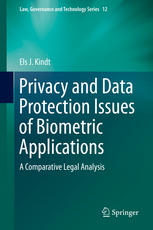

Most ebook files are in PDF format, so you can easily read them using various software such as Foxit Reader or directly on the Google Chrome browser.
Some ebook files are released by publishers in other formats such as .awz, .mobi, .epub, .fb2, etc. You may need to install specific software to read these formats on mobile/PC, such as Calibre.
Please read the tutorial at this link: https://ebookbell.com/faq
We offer FREE conversion to the popular formats you request; however, this may take some time. Therefore, right after payment, please email us, and we will try to provide the service as quickly as possible.
For some exceptional file formats or broken links (if any), please refrain from opening any disputes. Instead, email us first, and we will try to assist within a maximum of 6 hours.
EbookBell Team

4.1
10 reviewsThis book discusses all critical privacy and data protection aspects of biometric systems from a legal perspective. It contains a systematic and complete analysis of the many issues raised by these systems based on examples worldwide and provides several recommendations for a transnational regulatory framework. An appropriate legal framework is in most countries not yet in place.
Biometric systems use facial images, fingerprints, iris and/or voice in an automated way to identify or to verify (identity) claims of persons. The treatise which has an interdisciplinary approach starts with explaining the functioning of biometric systems in general terms for non-specialists. It continues with a description of the legal nature of biometric data and makes a comparison with DNA and biological material and the regulation thereof. After describing the risks, the work further reviews the opinions of data protection authorities in relation to biometric systems and current and future (EU) law. A detailed legal comparative analysis is made of the situation in Belgium, France and the Netherlands.
The author concludes with an evaluation of the proportionality principle and the application of data protection law to biometric data processing operations, mainly in the private sector. Pleading for more safeguards in legislation, the author makes several suggestions for a regulatory framework aiming at reducing the risks of biometric systems. They include limitations to the collection and storage of biometric data as well as technical measures, which could influence the proportionality of the processing.
The text is supported by several figures and tables providing a summary of particular points of the discussion. The book also uses the 2012 biometric vocabulary adopted by ISO and contains an extensive bibliography and literature sources.